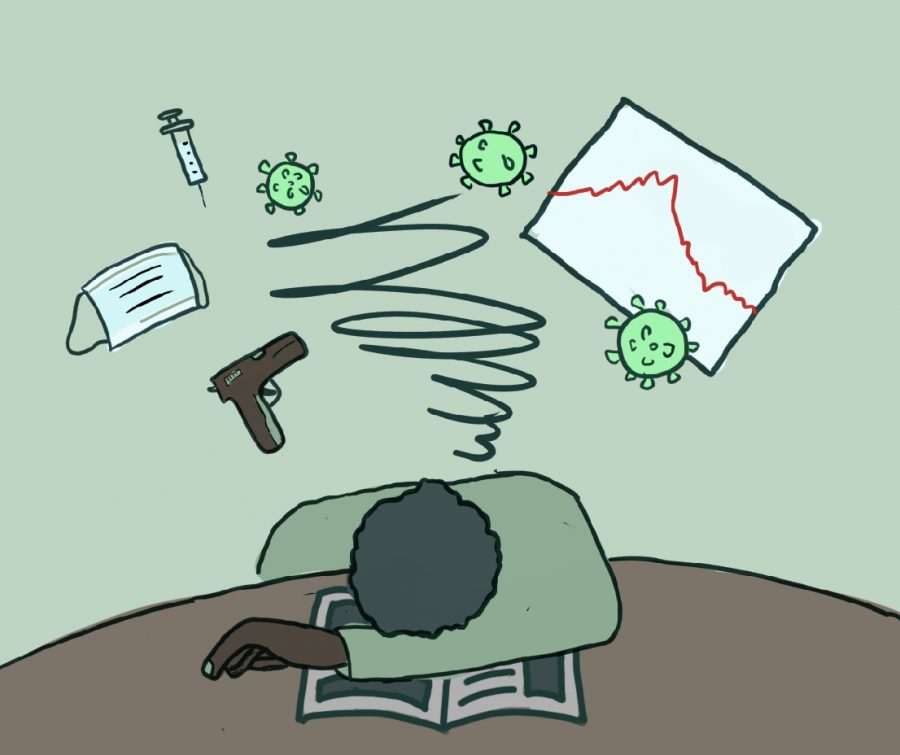The Bearer of Bad News: How Negative Covid-19 Reporting is Hurting Mental Health
“I’m going to reflect on the recurring feeling I have of impending doom,” says CDC director Dr. Rochelle Walensky.
“Then at the end of 2023 and the beginning of 2024, we enter the ‘post-pandemic period,’” says Yale professor Nicholas Christakis.
A recent study out of Dartmouth College highlighted in a New York Times article found that national news coverage of Covid in the U.S. has been exceptionally negative. The article says that “about 87 percent of Covid coverage in national U.S. media last year was negative.” This negativity has an impact, and it’s not a good one. With mental health already at a crisis, Covid-19 news reporting must shift to a more optimistic perspective in order to prevent further damage.
School cancelations and the loneliness that comes with social distancing practices have unsurprisingly caused an increase in depression among teenagers. What is surprising, however, is how extreme and dangerous this increase has been. In late November, the CDC found that 1 in every 4 young adults had considered suicide in the past 30 days. In a more specific example, the Pima County Health Department in Arizona saw “a 67% increase in suicides this year among children ages 12 to 17.” And having especially negative Covid-19 news reporting is certainly not helping.
Researchers have found a clear link between exposure to negative Covid-19 news reporting and deteriorating mental health. A paper out of Boston Medical Center states that “mounting research” finds that people reading news about Covid-19 is correlated with a dramatic “increase the risk of mental health problems.” To someone who is in a secure mental state, negative news may be quite upsetting, but for someone who is already in a vulnerable state, it can be enough to push them over the edge.
As the New York Times article observed, the problem is not that everything to report is negative, but that we only focus on what’s going wrong. The article says, “when Covid cases were rising in the U.S., the news coverage emphasized the increase. When cases were falling, the coverage instead focused on those places where cases were rising.” Similarly, on the same day that the director of the CDC expressed a feeling of “impending doom,” London recorded zero daily deaths due to Covid-19 for the first time in more than 6 months.
We must shift our emphasis when it comes to Covid-19 reporting. Instead of describing every possible piece of negative news, we should be reporting optimism and hope. In particular, with vaccines rolling out, there is lots to be excited about.
While one might think that focusing on the good would distort the truth, optimistic messaging does not imply “sugar-coating” or any decrease in the accuracy of reporting. Rather, it is a shift from cherry-picking negative news to focusing on domains where we can be hopeful. According to the Dartmouth study, in contrast to the U.S., international reporting was “51 percent” negative, and that it appeared that all reporting they looked at was accurate. The fact that U.S. national reporting has been drastically more negative than international reporting shows that it is entirely possible to have more optimistic messaging while still reporting accurately.
This shift to more optimistic reporting is not only important and very doable, but necessary. As we consider each death due to Covid-19, we should consider every death due to emotional distress surrounding Covid-19 just as seriously. National mental health is at an extremely precarious state, and decreasing the amount of negative Covid-19 news reporting can significantly alleviate the problem. We’ve spent a lot of time focusing on protecting our nation’s physical health, but now it’s time to save our nation’s mental health.







